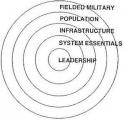• The first obligation of an international intervention force in a peace or stability operation is to provide security for the civilian population. Inevitably the arrival of foreign military forces is followed by a breakdown of public order.
• Historically U.S. military forces have been unable or unwilling to perform police functions to control large-scale civil unrest. This was true in Iraq, where looters destroyed government buildings, cultural centers, and commercial areas.
• The United States lacks civilian constabulary (gendarmes) or other national police forces specially trained for crowd and riot control. Instead the U.S. relies on civil police provided by commercial contractors that do not perform this function.
• Fortunately the U.S. government is taking steps to address this deficiency. Current State Department plans call for creation of a Civilian Reserve Corps that would have a police component.
• There is no agreement on the ultimate size and character of this police capacity. However, the history of U.S. interventions from Panama to Iraq argues for a robust capability.
• A review of U.S. interventions in post-conflict environments demonstrates that the United States has repeatedly needed highly capable police forces but has lacked the capacity to respond effectively. The case studies in this report provide lessons applicable to future operations.
• The State Department’s current efforts are a useful first step that will give an opportunity to create the basic infrastructure for expansion of U.S. capabilities in peace and stability operations.
















Bookmarks